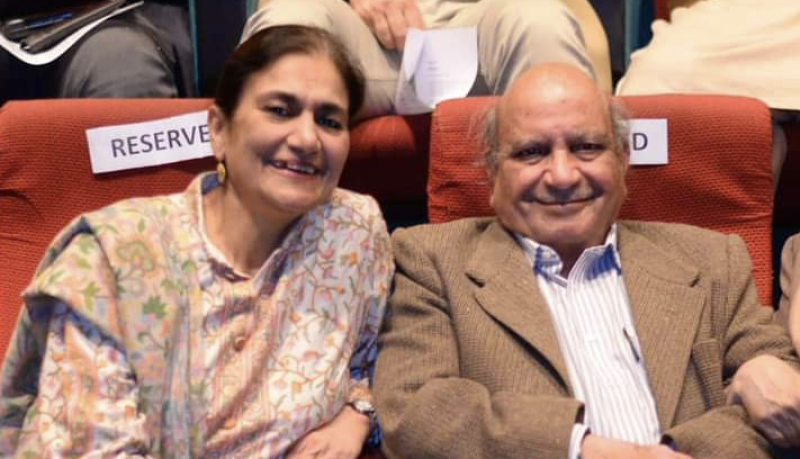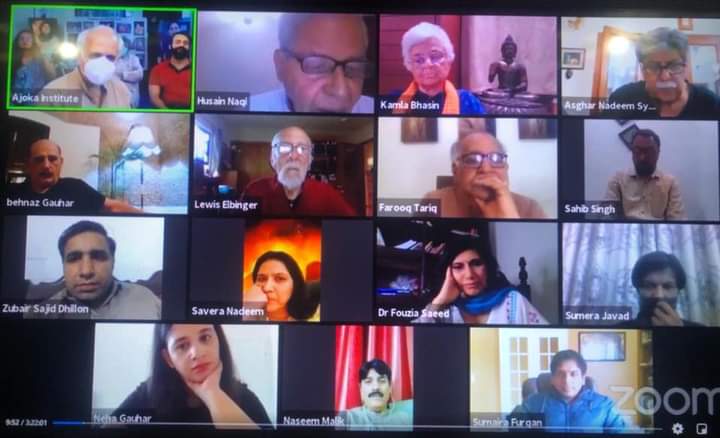
Lahore-based performing arts group Ajoka Theatre held an exclusive international webinar on Zoom to commemorate human rights icons, I.A.Rehman and Madeeha Gauhar. The event was attended by a large gathering of human rights campaigners and theatre professionals from Pakistan, India, US, Canada and UK.
 The speakers shared their memories of both I.A. Rehman and Madeeha Gauhar and the profound impact of the two icons on the causes of democracy, peace and cultural freedom. They highlighted their contribution towards peace with India and steadfast opposition to the menace of fundamentalism in Pakistan. Ajoka’s directors Shahid Nadeem and Nirvaan Nadeem hosted the event. A video showing images of Mr Rehman’s support for Ajoka and Madeeha’s work was also presented. The event was also live-streamed on the Facebook.
The speakers shared their memories of both I.A. Rehman and Madeeha Gauhar and the profound impact of the two icons on the causes of democracy, peace and cultural freedom. They highlighted their contribution towards peace with India and steadfast opposition to the menace of fundamentalism in Pakistan. Ajoka’s directors Shahid Nadeem and Nirvaan Nadeem hosted the event. A video showing images of Mr Rehman’s support for Ajoka and Madeeha’s work was also presented. The event was also live-streamed on the Facebook.
I.A.Rehman
I.A.Rehman was a Pakistani peace and human rights advocate and a veteran journalist. He was born in Haryana, India. He migrated from Aligarh to Lahore and completed his Msc Physics from FC college. He was the founder of Pakistan-India people’s forum for peace and democracy, and editor-in-chief of Pakistan Times.
Rehman spent decades opposing military dictators and fighting for the rule of law and democracy. He was a “mild giant who led generations of Pakistanis in struggle for democratic freedom”. Rehman was also the honorary spokesman and former secretary general of the Human Rights Commission Of Pakistan. His columns for the daily Dawn articulated concerns for Pakistan’s religious minorities, advocated a tolerant, democratic society and for peace between India and Pakistan. He had “run-ins with the Pakistani establishment as he took a bold stand against atrocities by Pakistani forces in East Pakistan, martial law under General Zia-ul-Haq and later the emergency imposed by General Pervaiz Musharraf and fought for several causes including minority rights and excesses by security forces,” recalled participants. He was a gentle human being who was brave, wise and witty. He was “Faiz’s comrade and Asma Jahangir’s guide and source of inspiration”, an activist said while paying glaring tribute to the icon.
Rehman was a role model, a pillar of support and strength for all activists around the country and a human rights warrior who became the voice of many voiceless, marginalised Pakistanis.
In his last column on DAWN, he lamented how Pakistan’s political discourse had become marred with the rise of a vulgar political discourse. He wrote: “The common practice in Pakistan is to condemn the opposition groups as thieves and receive an identical response in return. This was not always the practice in this country and political rivals were treated with due courtesy. The change for the worse is the contribution to political discourse by characterless upstarts. The usual practice these days (referring to narrative of “thieves” forwarded by the present government) is to raise one’s stature by demeaning the other and this often without the requisite information. Thus exchanges between political opponents quite often become weird exercises in search for the most vulgar labels for adversaries.”
Madeeha Gauhar
Considered by many as the first Pakistani woman to have introduced parallel theatre within the country, Madeeha Gauhar, was recalled as a frontline woman warrior for human rights in Pakistan. She passed away aged 62 after fighting a three-year battle with cancer on April 25, 2018.
The artist was awarded the Tamgha-e-Imtiaz by the government of Pakistan in 2003 and the Fatima Jinnah Award in 2014 for her remarkable services. The participants further noted that the government of Netherlands also recognised Madeeha’s contributions to theatre and rewarded her with the Prince Clause Award in 2006. Well known for her commitment to theatre for social change and promoting peace between Pakistan and India, she was also nominated for Nobel Peace Prize in 2005.
According to writer Asghar Nadeem, “Madeeha Gauhar was a very brave lady. I have known her since she started Ajoka Theatre and have witnessed the struggles she faced because of our society.” Madeeha was very active during the marital law era and used theatre as a constructive tool. “She strongly believed in human rights and did not hold back in portraying this through theatre...I believe Madeeha is incomparable as no woman has ever had the courage to step foot into theatre and make such a huge difference,” added Asghar.
Some of her famous plays include Kabeera Khara Bazaar Mai, Kaun Banega Badshah, Kaun Hai Yeh Gustakh, Mera Rang De Basanti Chola, Shehar-e-.Afsos, Dekh Tamasha Chalta Ban and many more. It is worth mentioning that as envisioned by Madeeha, Ajoka's plays have addressed issues related to women's rights such as female literacy, honour killings, rights of the girl child, health and family planning. Ajoka has performed all over the world, including India, Bangladesh, Nepal, Sri Lanka, Oman, Iran, Egypt, Hong Kong, the US, UK and Norway.
The event ended with the screening of extracts from drama serial, ”Neelay Hath” which was inspired by Madeeha Gauhar’s activism during the era of late Gen Zia ul Haq. She also played the lead role in that serial.
 The speakers shared their memories of both I.A. Rehman and Madeeha Gauhar and the profound impact of the two icons on the causes of democracy, peace and cultural freedom. They highlighted their contribution towards peace with India and steadfast opposition to the menace of fundamentalism in Pakistan. Ajoka’s directors Shahid Nadeem and Nirvaan Nadeem hosted the event. A video showing images of Mr Rehman’s support for Ajoka and Madeeha’s work was also presented. The event was also live-streamed on the Facebook.
The speakers shared their memories of both I.A. Rehman and Madeeha Gauhar and the profound impact of the two icons on the causes of democracy, peace and cultural freedom. They highlighted their contribution towards peace with India and steadfast opposition to the menace of fundamentalism in Pakistan. Ajoka’s directors Shahid Nadeem and Nirvaan Nadeem hosted the event. A video showing images of Mr Rehman’s support for Ajoka and Madeeha’s work was also presented. The event was also live-streamed on the Facebook.I.A.Rehman
I.A.Rehman was a Pakistani peace and human rights advocate and a veteran journalist. He was born in Haryana, India. He migrated from Aligarh to Lahore and completed his Msc Physics from FC college. He was the founder of Pakistan-India people’s forum for peace and democracy, and editor-in-chief of Pakistan Times.
Rehman spent decades opposing military dictators and fighting for the rule of law and democracy. He was a “mild giant who led generations of Pakistanis in struggle for democratic freedom”. Rehman was also the honorary spokesman and former secretary general of the Human Rights Commission Of Pakistan. His columns for the daily Dawn articulated concerns for Pakistan’s religious minorities, advocated a tolerant, democratic society and for peace between India and Pakistan. He had “run-ins with the Pakistani establishment as he took a bold stand against atrocities by Pakistani forces in East Pakistan, martial law under General Zia-ul-Haq and later the emergency imposed by General Pervaiz Musharraf and fought for several causes including minority rights and excesses by security forces,” recalled participants. He was a gentle human being who was brave, wise and witty. He was “Faiz’s comrade and Asma Jahangir’s guide and source of inspiration”, an activist said while paying glaring tribute to the icon.
Rehman was a role model, a pillar of support and strength for all activists around the country and a human rights warrior who became the voice of many voiceless, marginalised Pakistanis.
In his last column on DAWN, he lamented how Pakistan’s political discourse had become marred with the rise of a vulgar political discourse. He wrote: “The common practice in Pakistan is to condemn the opposition groups as thieves and receive an identical response in return. This was not always the practice in this country and political rivals were treated with due courtesy. The change for the worse is the contribution to political discourse by characterless upstarts. The usual practice these days (referring to narrative of “thieves” forwarded by the present government) is to raise one’s stature by demeaning the other and this often without the requisite information. Thus exchanges between political opponents quite often become weird exercises in search for the most vulgar labels for adversaries.”
Madeeha Gauhar
Considered by many as the first Pakistani woman to have introduced parallel theatre within the country, Madeeha Gauhar, was recalled as a frontline woman warrior for human rights in Pakistan. She passed away aged 62 after fighting a three-year battle with cancer on April 25, 2018.
The artist was awarded the Tamgha-e-Imtiaz by the government of Pakistan in 2003 and the Fatima Jinnah Award in 2014 for her remarkable services. The participants further noted that the government of Netherlands also recognised Madeeha’s contributions to theatre and rewarded her with the Prince Clause Award in 2006. Well known for her commitment to theatre for social change and promoting peace between Pakistan and India, she was also nominated for Nobel Peace Prize in 2005.
According to writer Asghar Nadeem, “Madeeha Gauhar was a very brave lady. I have known her since she started Ajoka Theatre and have witnessed the struggles she faced because of our society.” Madeeha was very active during the marital law era and used theatre as a constructive tool. “She strongly believed in human rights and did not hold back in portraying this through theatre...I believe Madeeha is incomparable as no woman has ever had the courage to step foot into theatre and make such a huge difference,” added Asghar.
Some of her famous plays include Kabeera Khara Bazaar Mai, Kaun Banega Badshah, Kaun Hai Yeh Gustakh, Mera Rang De Basanti Chola, Shehar-e-.Afsos, Dekh Tamasha Chalta Ban and many more. It is worth mentioning that as envisioned by Madeeha, Ajoka's plays have addressed issues related to women's rights such as female literacy, honour killings, rights of the girl child, health and family planning. Ajoka has performed all over the world, including India, Bangladesh, Nepal, Sri Lanka, Oman, Iran, Egypt, Hong Kong, the US, UK and Norway.
The event ended with the screening of extracts from drama serial, ”Neelay Hath” which was inspired by Madeeha Gauhar’s activism during the era of late Gen Zia ul Haq. She also played the lead role in that serial.
